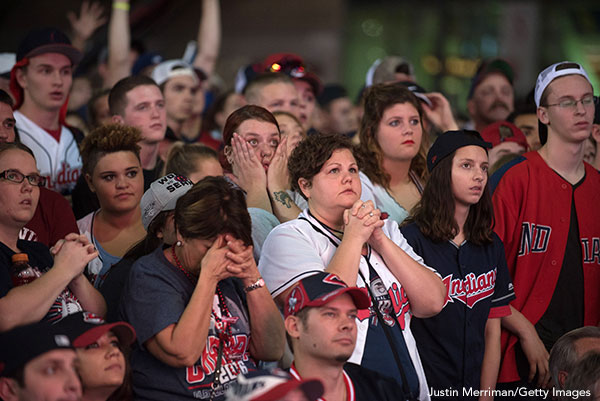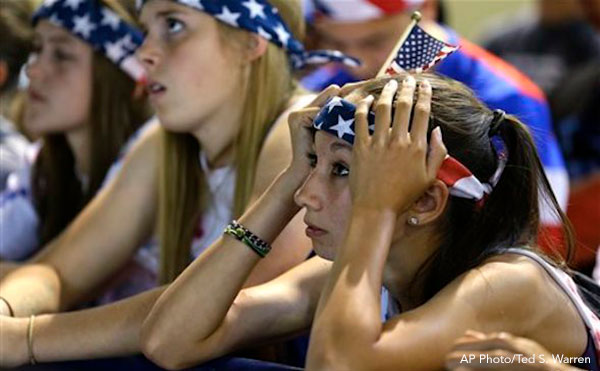Along with more than 63 million of my fellow Americans who voted for Hillary Clinton, I sat in shock and bewilderment as the results of Election 2016 unfolded. The only positive to that evening is that it will be four years before I have to hear Wolf Blitzer say "Wayne County" or "Democratic Firewall" again.
But once the race was called and Donald J. Trump took the stage as our president-elect, a rather calm sensation took over my body. Sure, I was upset with the result. I have been a proponent of the Clintons ever since I met Arkansas Governor William Jefferson Clinton at a "meet and greet" that only 15 people attended off-campus at the University of Pennsylvania, well before he was a legitimate contender for the office he ultimately won. I went on to become a White House Intern and was assigned to the Office of the First Lady, doing healthcare casework for average American citizens who needed help with their insurers. I was firmly on Team Clinton. But the visceral, physical reaction that I had election evening immediately dissipated upon the result becoming official. The pit in my stomach subsided.

I had accepted the situation for what it was and had immediately moved on to "what's next?"
The same could not be said for many others. For the past two weeks my Facebook page has been filled with emotional treatises. Even state legislatures came out with statements that felt as much therapeutic for themselves as they were meant to be reassuring to their citizens.
I asked myself: Why was I so easily able to accept this result and so many others were not? My realization: I've become very good at losing.
And why am I better at accepting defeat than others? Because I'm a sports fan.
At its core, sports is actually more about losing and dealing with loss than it is about basking in victory or success.
The construct of sports is many teams competing over a defined period of time. During the season there is a winnowing down until the final two face off. In the end, there is only one winner. Everyone else loses. And this process plays out every season, for every sport, over and over again.
Consider: 96.875 percent of NFL fans' teams do not win the Super Bowl every year, and 99.7 percent of Division I college basketball fans will not be those of the national champions.
Sports fans are used to losing. Losing is a muscle. The more one exercises it, the more quickly one is able to bounce back.
With elections, certainly the stakes are bigger when you are talking about your country rather than your team, but the physiological response to losing is exactly the same as in sports.
"There are all kinds of emotions that are going to be created by losing – anger, resentment, guilt, perhaps fear, shame and anxiety and in rare cases loneliness and depression," says Dr. Arnold LeUnes, a sports psychology professor at Texas A&M. "And of course there is a good deal of disbelief and denial that certainly goes with it. It's very difficult to acknowledge that you just lost something that's very important to you."
Dr. Patrick Cohn, a Mental Master Game Coach at Peak Performance Sports, says expectations can intensify those feelings after a loss.
"If you expected your team ... if your team had to win that game against the rival, then there's going to be more heartache associated with that," says Cohn, who works with hundreds of athletes on improving their psychological approach.

Feelings are what make us human. That's our nature. The question is what are the techniques we can employ to recover and to ensure the negativity associated with loss doesn't prohibit us from moving forward. Cohn recommends a three-point plan for those that lose:
1. Manage your expectations about need to win all the time.
2. Rationalize that it's not the end of the world.
3. Shift gears and move on to other roles in your life. Stop dwelling.
LeUnes, who has been on the Texas A&M faculty for more than 50 years, believes it is all about mindset.
"Venting or catharsis is a healthy psychological mechanism and certainly social media allows for a lot of venting ... and maybe it's a healthy way of expressing that," LeUnes says. But he adds, "Converting the negatives to a positive is really the key."

If that's not a natural tendency for you, consider these techniques:
1. Practice "thought stoppage." Whenever you have a negative thought creep in say "Stop" or snap your fingers. At which point you can institute some positive thought processes.
2. Engage in "Self Talk" -- believing that "what we say is what we become."
3. Move from a "Product Mentality" (e.g., winning is everything") to a "Process Mentality" (e.g., participating is everything, and without your adversaries you wouldn't even have the game; competitors are see as peers in the quest).
4. Reframe negative thoughts and recast as positive thoughts. (They tell the great story of MLB Hall of Famer Wade Boggs. When a baseball player gets an 0-2 count, his average slumps to .180. For Boggs, however, his average was over .300. When asked why he hit so well 0-2, Boggs said that he felt like he had the advantage over the pitcher because he had already seen two of his pitches. That's "reframing" on a master level.)
"There are things you just learn from getting knocked down and lining up and going again," LeUnes says. "I think sports does that and maybe being a spectator does that. You get practice at rebuilding yourself after you lose because you are going to lose as a fan a lot more than you win. Maybe sports does, in fact, harden you and make you more capable of making those adjustments."
Michael Jordan, arguably the greatest basketball player of all time, might be the most mentally strong athlete of our generation. And it was his approach to failure that enabled his greatness:

My conclusion is this: While it is winning that everyone seems to focus on, losing is perhaps the greatest gift we have been given from sports. The lessons we've learned from dealing with loss have better prepared us for the game of life. Or at least this last election cycle.





